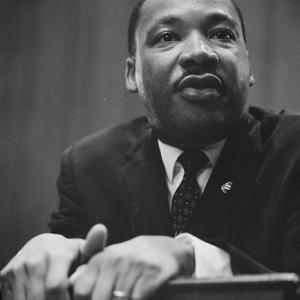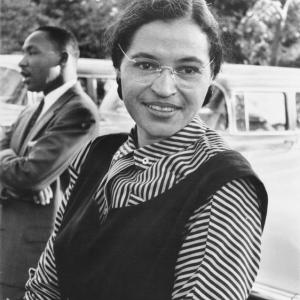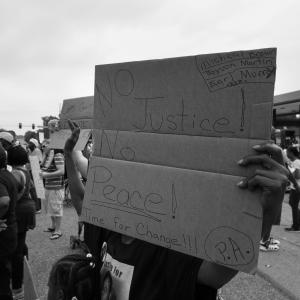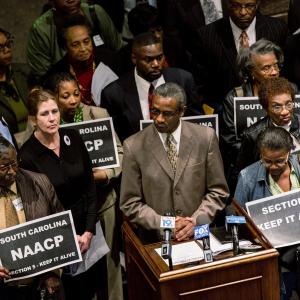The Rev. Ruth Hawley-Lowry has pastored in the New York, Chicago, and Grand Rapids areas. On the 40th Anniversary of Rev. Dr. Martin Luther King, Jr.'s martyrdom, Naomi Tutu and she organized a gathering with moms from Nashville and professors and pastors from Boston, Baltimore, and D.C. on the steps of Lincoln Memorial.
Posts By This Author
Much More Than a Seat on the Bus: 60 Years Later
We have told ourselves the story that somehow benevolent white folks acquiesced (and perhaps even saw the error of our ways) and, after a court case, “let” Mrs. Parks and all black folks sit wherever they wanted to on a bus. And, golly, looking back perhaps we were a little stringent in fussing about who sat where on a bus—but that’s all behind us now. Goodness—it sure would be nice if people would just stop talking about race!
The problem with this narrative is that it isn’t true. We in America haven’t dealt with the complicated history of what happened on Dec. 1, 1955 — or what happened before, or after. Many Americans have heard the name “Rosa Parks,” and they may have heard something about a bus. But they don’t know the history. As we look at the profound unrest and distrust in our nation, it is important to know the history.
How Will the Massacre at Emanuel AME Affect White Churches?
5 Ways to Respond
The challenge is this: We in our collective American consciousness have yet to admit, much less confess, of the racist underpinnings that our nation was founded and built upon. We struggle with admitting that all of us who are white have racially informed understandings in our spirit that were inculcated in our being from birth. As the Rev. Dr. Gardner Taylor said, “Racism in is the water we drink and the air that we breathe.” So then, nationally, when a politician or celebrity says something that is racist in nature, we act like the eradication of their contract eradicates racism. That is not the case.
Imagine it IS Your Family
Our nation has a problem. It is not a “black” problem or a “white” problem, but a “human” problem that we all succumb to — and have the power to change. Our beloved nation was NOT “conceived in liberty” OR “dedicated to the proposition that all men are created equal,” despite President Lincoln’s well-intentioned words. That was the hope, but it has never been the reality.
Many of my African-American sisters and brothers are furious. Yet another child has been felled. The challenge is this — if a tree falls in the forest and white folks don’t hear it, does it make a noise? Many of us who are white do not have the contextual experience or the “ears to hear” to understand the fear and the fury.
More than a decade ago, I pastored in a community that was predominately African American. It grew from 72 percent to 98 percent black in just seven years as a result of “white flight.” In the course of this time, the police force struggled because it didn’t listen to the people. Most of the officers were white and could legally live up to 30 miles away; as a result many (including the chief) lived in another state.
At one heated meeting, the police chief informed us what we “could” and “could not” do as we discussed community initiatives that included the older white and adolescent black residents in conversation and collaboration. Finally, as the pastor of one of the larger churches in town, I stood up and said, “Chief, please understand that we are not asking for your permission. We are telling you what we, as citizens of this town, are going to do. Now we need to know — are you with us? Or not?” The African-American residents stood and clapped loudly. I felt their pain and the reason for what some perceived as “paranoia,” but what I knew to be legitimate fury.
Voting Rights Act Challenge: The Fight Continues
I was on the airplane, looking forward to reading Taylor Branch’s new book, The King Years: Historical Moments in the Civil Rights Movement. As I opened my Kindle, I realized that it offered large excerpts of Branch’s previous works, and was glad that while I have the other books in hard cover, I had these stories in my Kindle. But as I re-read some of the accounts, I realized that my 40-something-old self reacted differently than when I first read some of the accounts when I was 20-something. My younger self yearned to know: How did they organize? How did they deal with differing motives and different movements? And I yearned to believe that I, too, would have sacrificed my being for “The Movement.”
My late 40-something-old self read these words as a mother — as someone who understood the fury of the parents who were scared as their children sacrificed their very lives for justice’s sake.
Martin Luther King Sunday is Not Just for Black People

Dr. Martin Luther King, Jr., in 1964. Image via Wiki Commons http://bit.ly/zBt6dr
The Rev. Dr. Martin Luther King did not give his life just for Black Americans, but for all Americans. He knew America could be better. He knew the America that was birthed with the hope of “liberty for all” excluded hundreds of thousands of people.
As he said in his famous sermon that is so often referred to as the “I Have a Dream” speech,
In a sense we have come to our nation's capital to cash a check. When the architects of our republic wrote the magnificent words of the Constitution and the Declaration of Independence, they were signing a promissory note to which every American was to fall heir. This note was a promise that all men, yes, black men as well as white men, would be guaranteed the unalienable rights of life, liberty, and the pursuit of happiness....
Reformation Day and You(2): Reformed and Always Reforming
When I was ordained as a "Minister of Word and Sacrament" in the Reformed Church in America, a denomination that began in 1628, I imagined that I was being ordained to a church that was "reformed and always reforming!" (Emphasis mine).
Reformata et semper reformanda was a theme of the Reformation, which Martin Luther kicked off on Oct. 31, 1517 when he nailed his Ninety-Five Theses to front door of Castle Church of Wittenberg, Germany.
But rather than reviewing history from a half-millennia ago, let me explain what I hoped for 22 years ago, when I was ordained.
Happy Birthday, Rosa Parks
Global AIDS Day and Advent
The Legacy of Martin Luther King: Time to Break the Silence
Why August 28 Matters (It's Not About Glenn Beck)
Glenn Beck Co-opting the Steps of the Lincoln Memorial
Mother's Day Challenges
Tragic Anniversaries and Embodying Resurrection Hope
'God, is it Okay to Be Afraid Now?'
Hearing MLK's Full Message
This year, as we celebrate the birth of the Rev. Dr. Martin Luther King, Jr. we are too often tempted to celebrate what has been achieved rather than examine what God continues to call out of us. Hopefully we know that there is no such thing as "post-racial," even after the election of an African American president.
World AIDS Day and Rosa Parks' Civil Disobedience
46 Years and Counting: What Happened to the Dream?
Forty-six years ago, on Aug. 28, the Rev. Dr. Martin Luther King Jr. stood and gave the "I Have a Dream" speech [full video below]. And even this sentence reveals one of the fundamental struggles that continues in our nation.
Kennedy, Health Care, and Imperfection
Reflections on an Election Year Holy Week
What Keeps Us From Living MLK's Dream?
Last year Naomi Tutu and I met on the steps of the Lincoln Memorial to keep vigil on the 40th anniversary of the martyrdom of the Rev. Dr. Martin Luther King Jr. Friends joined us from around the country. We asked the visitors gathered there: "What keeps us from living the Dream?" Most folks spoke of fear. Some spoke of ignorance.



